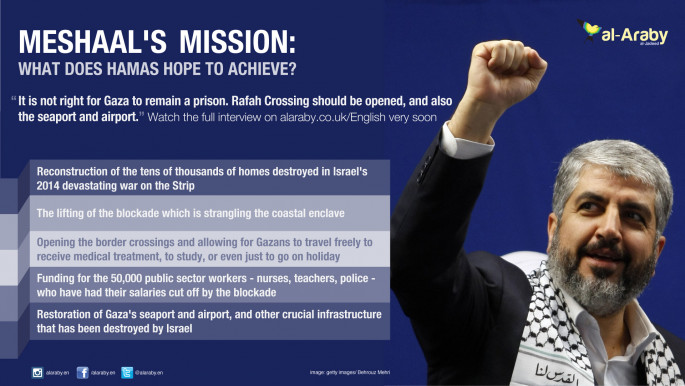Video: Meeting Khaled Meshaal, Hamas' political chief
Negotiations through intermediaries have yielded some results, though no breakthrough agreement has yet been reached, he told al-Araby al-Jadeed in an exclusive and wide-ranging interview.
Watch the interview now, by clicking on the image at the top of this article.
Khaled Meshaal became the political head of Hamas, the Palestinian Islamic organisation, following Israel's 2004 assassination of its former leader, Abdel Aziz al-Rantisi.
Meshaal was expelled from Jordan in 1999 after Hamas was banned there. He moved to Qatar, then to Damascus in 2001.
In 2012, Hamas distanced itself from the Syrian government and supported the Syrian opposition. Hamas closed its offices in Damascus and Meshaal returned to Qatar.
 |
|
Meshaal has revealed his five key priorities for Gaza in order for a "natural atmosphere to be created for securing a stable ceasefire":
- Reconstruction of the tens of thousands of homes destroyed in Israel's 2014 devastating war on the Strip.
- The lifting of the blockade which is strangling the coastal enclave.
- Opening the border crossings and allowing for Gazans to travel freely to receive medical treatment, to study, or even just to go on holiday.
- Funding for the 50,000 public sector workers - nurses, teachers, police - who have had their salaries cut off by the blockade.
- Restoration of Gaza's seaport and airport, and other crucial infrastructure that has been destroyed by Israel.
In the interview, Meshaal also tells how the former Quartet envoy, Tony Blair, told him that Hamas should offer a truce to Israel.
"Our answer was: We don't need calm or a truce, we don't need new terminologies, as we don't want wars.
"There is a legitimate resistance that will continue working against the occupation as long as there is occupation and settlements - but we don't want wars."
Hamas remains open to all efforts established towards a solution for Gaza, Meshaal told al-Araby, but such efforts must not undermine Palestinian rights, or the national interest.
On the UNRWA funding shortfall, Meshaal said: "This is the international community's moral and political responsibility. Money is not an obstacle and no one is convinced that UNRWA cannot pay its bills."
Meshaal said that his visit to Saudi Arabia "resolved some misunderstandings" and that the two sides agreed to "start a new page based on understanding, clarity and transparency".
Meshaal said that the relationship with Egypt had started to improve and that it has been "proven" that Hamas did not interfere in Egypt's affairs.
Meshaal said that the relationship with Iran is historic and "still exists but it has been affected in the past few years by the disagreement on the Syrian crisis".
Meshaal also said that Hamas had been trying for years to reach reconciliation with Fatah through new elections, a single government and working towards achieving community harmony.





 Follow the Middle East's top stories in English at The New Arab on Google News
Follow the Middle East's top stories in English at The New Arab on Google News


